Trump Says Biden Admin Is Allowing Iran To Build Nuclear Weapons
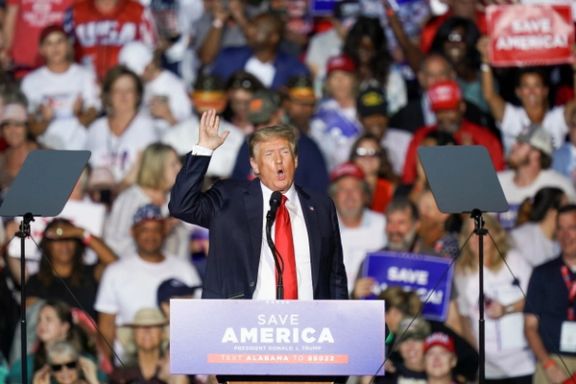
Former US president Donald Trump says Washington is allowing Iran to build “a massive nuclear weapon,” criticizing the Biden administration’s policies regarding the Islamic Republic.

Former US president Donald Trump says Washington is allowing Iran to build “a massive nuclear weapon,” criticizing the Biden administration’s policies regarding the Islamic Republic.
Delivering a keynote speech on rising crime in the United States on the second day of a two-day America First Agenda Summit on Tuesday, July 26, in Washington, Trump said Iran would never have been allowed to develop nuclear weapons if he had been the president.
“They (Iran) were dying to make a deal. They would have made a deal with us right after the election, and it would have been a good deal,” he added.
Trump claimed that “Iran, China, Russia and North Korea weren't going to do a thing against us just two years ago,” but now “we're a nation that is no longer respected or listened to around the world. We are a nation that in many ways has become a joke.”
Lashing out the policies of President Joe Biden and the Democratic Party for the country's ills, he decried Biden allowing an "invasion" by millions of migrants crossing the southern border, highest inflation in 49 years and highest gas prices “in the history of our country." "Our country is going to hell and is going to hell very fast... We are a nation in decline. We are a failing nation."
He stopped short of declaring his candidacy but hinted that he would run for president in the next election, noting that a Republican will be back in the White House in 2024.
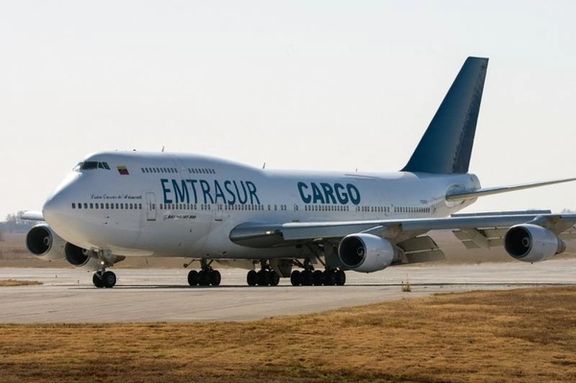
Eleven Republican Senators have sent a letter to the US attorney general for what they say is a delay in helping with information on Iranians held by Argentina.
The influential Senators, including Lindsey Graham, Marco Rubio and Chuck Grassley and Ted Cruz have signed the letter led by Sen. Joni Ernst of Iowa say that after Argentina detained Iranians with links to the Revolutionary Guard in early June, the Biden Administration “has refused to provide key Argentinian law enforcement officials information confirming links to terrorist activities.”
Argentina’s security minister Anibal Fernández tweeted on June 11 that the government detained a Venezuelan plane sanctioned by the United States and withheld the passport of five Iranian crew members. The admission by the minister came after a local website reported on the incident. Later it was revealed that the pilot of the Iranian plane “leased” to a Venezuelan cargo carrier.
A week later, as Argentina downplayed any links with the Revolutionary Guard, head of the Paraguayan National Intelligence Secretariat Esteban Aquino said Captain Gholamreza Ghasemi of the 747 cargo plane was a member of the IRGC Qods (Quds) Force, sanctioned by the US for terror activities.
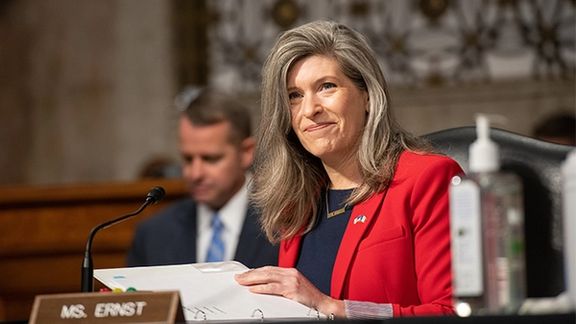
According to the senators who have sent a letter to Attorney General Merrick Garland, the Argentinian judiciary has asked for information “key to their investigation into the Iranian suspects” held since June. The senators say that “The Argentine judiciary, through standard process which is called the Mutual Legal Assistance Treaty (MLAT) program, requested information from the Justice Department on the potential involvement of the plane and its crew in support of international terrorism.”
The letter accuses the Biden administration of delaying information because it pursues to revive the 2015 nuclear agreement known as the JCPOA, which former President Donald Trump abandoned in 2018.
The senators say the alleged delay is “all to prioritize the administration’s desperate and misguided pursuit of a new Iran nuclear deal, it would be a disgrace and completely unacceptable. We need assurances right away that vital information will be promptly provided, along with a full explanation for the delay,”
The administration has yet to respond to the accusation, but its record in relation to Iran has been mixed since it launched indirect talks in Vienna in April 2021 to revive the JCPOA.
While the Biden team has issues new sanctions against individuals and companies involved in clandestine Iranian activities violating previous US sanctions, the administration has not vigorously enforced the major economic sanctions against Iran’s oil exports.
Since early 2021, China has more than doubled its illicit imports of discounted oil from the Islamic Republic, throwing a lifeline to its dire finances.
The senators warned that if it tuns out the administration purposely delayed or ignored Argentinian requests needed to carry out their investigation, “it would be a disgrace and completely unacceptable.” Sen, Ernst was quoted as saying, “We need assurances right away that vital information will be promptly provided, along with a full explanation for the delay.”
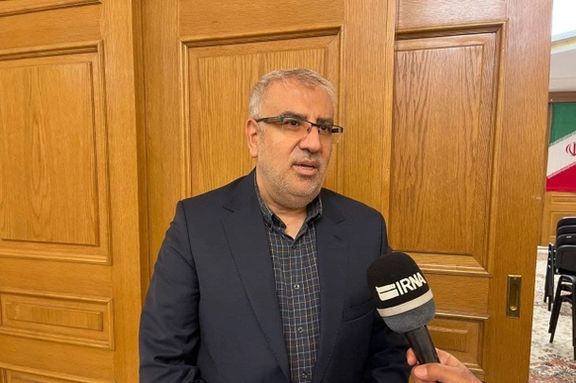
Iran's gas export revenue for the first four months of the Iranian year (March 21 to July 21) reached almost $4 billion, local media quoted Oil Minister Javad Owji as saying on Wednesday.
The country sits on the world’s second-largest gas reserves after Russia, but years of various international sanctions have prevented the technological development of its gas export sector.
"We have collected close to $4 billion of gas exports for the first four months of the year, which is nearly as much as what was collected for the entire previous year," Owji said.
On Tuesday Iran made a claim that its oil export revenues climbed by 580 percent from March 2021 to March 2022, although other government data show little revenue flowed into its treasury. Iran’s high inflation and a falling currency keep the economy in a crisis.
Iran mainly exports gas to Turkey and Iraq, but its delivery has not always been reliable due to debt-payment issues with Baghdad, Iran's own domestic consumption needs, and occasional technical problems which forced a momentary halt in exports to Turkey over the winter.
The Iranian government says it has found ways to repatriate funds from earlier energy exports and reached an agreement to resume gas supplies to Iraq in April as Baghdad paid part of its debts owed to Tehran.
Global gas prices have risen almost fivefold in 2022 and it is possible that Iran earned one billion dollars a month, although last year its gas exports totaled $4 billion.
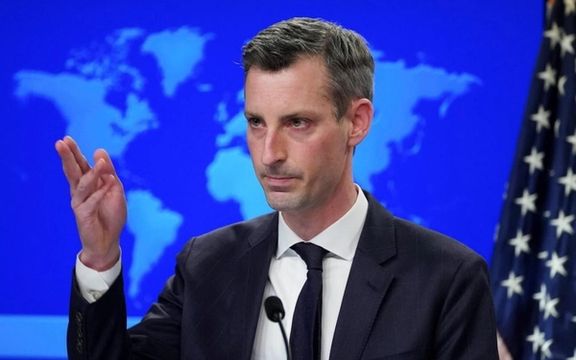
The United States says it is reviewing a draft understanding on reviving Iran’s nuclear deal that has been tabled by the European Union.
In his daily briefing on July 26, State Department spokesperson Ned Price said that “we are reviewing the draft understanding on mutual return to full implementation with the JCPOA that the high representative shared with us, as well as with Iran and the other JCPOA participants,” referring to a draft agreement by Josep Borrell, the EU high representative for foreign affairs and security policy.
About the proposal being fully acceptable to the Biden administration, he said “this new text” that Borrell referred to [in an op-ed] is based on “an outline of what we believe to be a good deal on the table since March that we have been prepared to accept.”
In an article published by the Financial Times on Tuesday, Borrell said there is “no other comprehensive or effective alternative within reach,” stressing the need for swift political decisions.
“We are studying the changes that have been proposed by the EU; we’ll respond to them in short order. And we hope that Iran finally and ultimately decides to seize the opportunity that has been before it for some time now,” he added.
Dodging a direct answer about any definite timeframe or deadline on the talks to restore the deal, Price said that “we are going to continue to pursue a mutual return to compliance with the JCPOA for as long as it’s in our interest to do so. That remains the case."
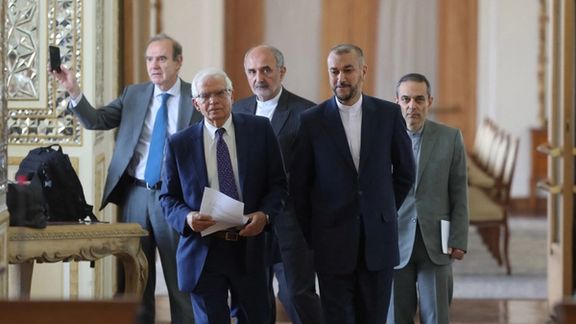
A hardliner Iranian lawmaker has warned and threatened Western countries negotiating a nuclear deal to return to the suspended talks before it is too late.
In a warning mixed with threats Iranian lawmaker Mohammad Hassan Asafari warned, "Iran's nuclear capabilities are being boosted and tomorrow would be too late for the West to return to the negotiations."
Asafari said in an interview with the government-owned Iranian Students News Agency (ISNA) that "the Western parties to the JCPOA have pushed the negotiations into a deadlock and it is in their interest to come back to the negotiating table."
The hardliner member of parliament also said: "It is a lie that it is the IRGC that prevents the negotiators from getting a result from the talks." He added: "This is not true. It is a lie told by the US side in the negotiations. What has led to the suspension of the talks is the reneging by the other side."
He was referring to numerous reports since the talks were suspended that Iran demands that the United States remove the Revolutionary Guard from its list of ‘Foreign Terrorist Organizations’.
Meanwhile, he criticized the Iranian government for not informing the parliament about where the negotiations stand, adding that the government's behavior is unacceptable.
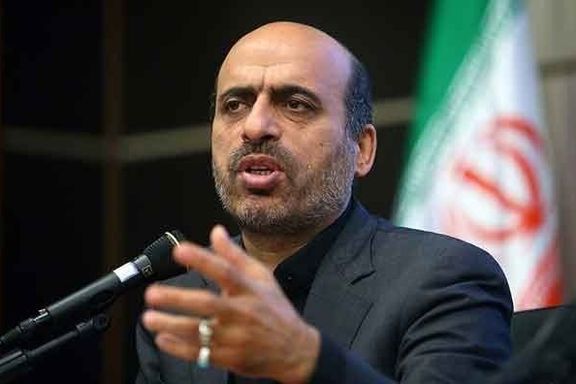
Hoever, Iranian Foreign Ministry's former director general for Middle east affairs, Ghasem Mohebali reiterated that the members of Iran's current negotiating team have always been opposed to the JCPOA. He added that recent developments in Iran including statements made by Supreme Leader Ali Khamenei's senior foreign policy adviser Ali Akbar Velayati have proven that the negotiators' objective is not to revive the JCPOA, and Tehran is no longer following that objective.
Velayati last week praised Russian President Vladimir Putin and recommended an alliance with Moscow.
Mohebali said that one of the main reasons why Iranian negotiators are not interested in telling the media about what they are doing is that they have not had any achievements and their inaction has brought the negotiations to a standstill. "They do not want to talk to the media because they do not want the public to know about their failure," he said.
The former diplomat added that members of Iran's former negotiating team were career diplomats who had a lot of experience and spoke English, while the members of the new team lack these attributes.
Mohebali further charged that the negotiating team does not have a roadmap for the talks. Asked if there is any hope for a change in this policy, Mohebali said: "Unfortunately, the government is inefficient in both domestic and foreign policy, and even in running the everyday business of its ministries. You cannot expect much from such a government." He added: "In a democratic country,” and in a democratic country they would have called for early elections.
Tehran needs political determination to revive the JCPOA, the former diplomat said and pointed out that Iran's new alliance with Russia is also a hindrance to returning to the talks.
Meanwhile, a statement made by Iran's nuclear chief Mohammad Eslami, appears to have made Iran's mixed messages to the West even more confusing. Eslami told the IRGC-linked Fars News Agency , this week that Iran will not allow monitoring cameras of the International Atomic Energy Agency (IAEA) to be turned on until there is a nuclear agreement.

The European Union foreign policy chief says the draft agreement to restore the JCPOA agreement addresses all elements with hard-won compromises by all sides.
In an article published by the Financial Times on Tuesday, Josep Borrell, the EU high representative for foreign affairs and security policy, said there is “no other comprehensive or effective alternative within reach,” stressing the need for swift political decisions “to seize this unique opportunity to succeed, and to free up the great potential of a fully implemented deal.”
Borrell said the JCPOA remains politically polarizing in Washington while the midterm elections approach as it may not have addressed all US concerns with respect to Iran, and the EU shares concerns that go beyond the nuclear issue, such as human rights and Iran’s activities in the region. “The JCPOA does not address them and was never supposed to do so. It did, however, provide the benefit of winding down the previously expanding Iranian nuclear program and opening it up to strict IAEA monitoring and inspections.”
He added that there are significant reservations over fully implementing a deal in Tehran too after the negative experience of recent years.
“The deal serves the cause of non-proliferation in return for sanctions lifting, showing that in turbulent times balanced international agreements are still possible,” he noted, saying that “Every day with no agreement in Vienna postpones concrete economic benefits to the Iranian people through substantial US sanctions lifting, as well as the benefits of non-proliferation for the world.”
Borrell also warned of “a dangerous nuclear crisis” if the deal is rejected, opening the “prospect of increased isolation for Iran and its people.”
Acknowledging the EU officials’ ideas to conclude the negotiations, Iran’s nuclear negotiator Ali Bagheri-Kani also said on Tuesday that he had serious and constructive exchanges with other sides in the past week on Vienna negotiations. “We, too, have our own ideas, both in substance and form, to conclude the negotiations which would be shared,” he added.
State Department spokesperson Ned Price in his daily briefing on July 25 said, lack of a response from Iran to the proposal made a while ago is an indication that Tehran is not serious and not ready to re-enter the JCPOA.
“And in fact, every day that they drag their feet or every day that is filled with nothing but silence on their end, it’s an indication to us that they are not serious and that they are not ready to re-enter the JCPOA on a mutual basis,” he said. US officials have maintained that an offer was made to Iran after months of talks in Vienna and so far Tehran has dragged its feet.
The comments came one day after chief of Iran's nuclear program, Mohammad Eslami said that Tehran will not allow monitoring equipment of the International Atomic Energy Agency (IAEA) to operate until the JCPOA is restored.
At the same time, the director general of the IAEA, the UN nuclear watchdog, Rafael Grossi told the Spanish newspaper El Pais on July 22 that Iran’s nuclear program is “galloping” forward. He added that enriching uranium at 60 percent is not needed if there are no military intentions, referring to Iran accumulating highly enriched fissile material that can be elevated to weapons-grade uranium in a relatively short time.